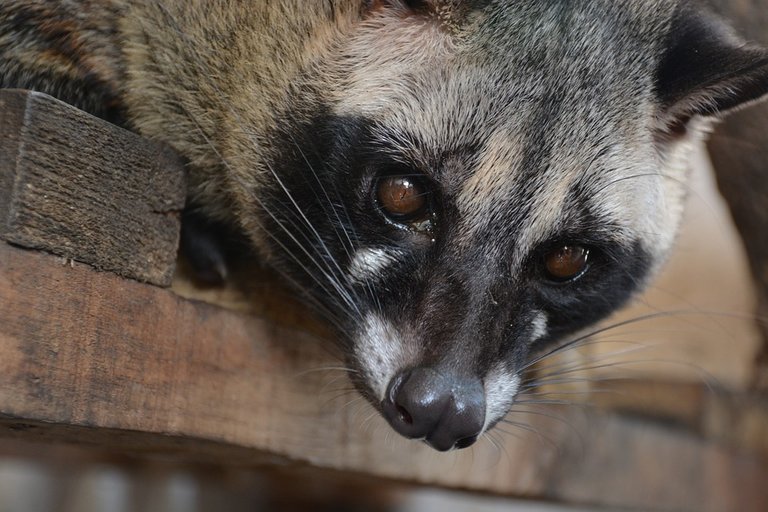I really like coffee and coffee drinks.
There is an opinion that coffee is harmful, but the facts say different.
Coffee is useful, but in moderation, not more than 3 cups of coffee a day!
In the world there is a huge choice of coffee. But I'll tell you about the most delicious coffee I drank! It's Kopi Luwak!

Kopi luwak or civet coffee, refers to the coffee that includes part-digested coffee cherries eaten and defecated by the Asian palm civet.
Although kopi luwak is a form of processing rather than a variety of coffee, it has been called one of the most expensive coffees in the world with retail prices reaching €550 / US$700 per kilogram. Kopi luwak is produced mainly on the islands of Sumatra, Java, Bali and Sulawesi in the Indonesian Archipelago. It is also widely gathered in the forest or produced in the farms in the islands of the Philippines, and in East Timor.

Kopi is the Indonesian word for coffee. Luwak is a local name of the Asian palm civet in Sumatra. Palm civets are primarily frugivorous, feeding on berries and pulpy fruits such as figs and palms.

The origin of kopi luwak is closely connected with the history of coffee production in Indonesia. In the early 18th century the Dutch established the cash-crop coffee plantations in their colony in the Dutch East Indies islands of Java and Sumatra, including Arabica coffee introduced from Yemen. During the era of Cultuurstelsel (1830–70), the Dutch prohibited the native farmers and plantation workers from picking coffee fruits for their own use. Still, the native farmers wanted to have a taste of the famed coffee beverage. Soon, the natives learned that certain species of musang or luwak (Asian palm civet) consumed the coffee fruits, yet they left the coffee seeds undigested in their droppings. The natives collected these luwaks' coffee seed droppings, then cleaned, roasted and ground them to make their own coffee beverage. The fame of aromatic civet coffee spread from locals to Dutch plantation owners and soon became their favourite, yet because of its rarity and unusual process, the civet coffee was expensive even during the colonial era.

Few objective assessments of taste are available. Kopi luwak is a name for any beans collected from the excrement of civets, hence the taste may vary with the type and origin of beans ingested, processing subsequent to collection, roasting, aging and brewing.

Genuine kopi luwak from wild civets is difficult to purchase in Indonesia and proving it is not fake is very difficult – there is little enforcement regarding use of the name "kopi luwak", and there's even a local cheap coffee brand named "Luwak", which costs under US$3 per kilogram but is occasionally sold online under the guise of real kopi luwak.

Source: Wikipedia
Also you can find some my earlier posts:
Health Benefits of Chocolate! Do you like chocolate?
How to grow eyebrows naturally? Valuable tips!

Thank you for your attention!
I hope my posts will be interesting to you!
Follow Me!

There is an opinion that coffee is harmful, but the facts say different.
Coffee is useful, but in moderation, not more than 3 cups of coffee a day!
In the world there is a huge choice of coffee. But I'll tell you about the most delicious coffee I drank! It's Kopi Luwak!

Kopi luwak or civet coffee, refers to the coffee that includes part-digested coffee cherries eaten and defecated by the Asian palm civet.
Although kopi luwak is a form of processing rather than a variety of coffee, it has been called one of the most expensive coffees in the world with retail prices reaching €550 / US$700 per kilogram. Kopi luwak is produced mainly on the islands of Sumatra, Java, Bali and Sulawesi in the Indonesian Archipelago. It is also widely gathered in the forest or produced in the farms in the islands of the Philippines, and in East Timor.

Kopi is the Indonesian word for coffee. Luwak is a local name of the Asian palm civet in Sumatra. Palm civets are primarily frugivorous, feeding on berries and pulpy fruits such as figs and palms.

The origin of kopi luwak is closely connected with the history of coffee production in Indonesia. In the early 18th century the Dutch established the cash-crop coffee plantations in their colony in the Dutch East Indies islands of Java and Sumatra, including Arabica coffee introduced from Yemen. During the era of Cultuurstelsel (1830–70), the Dutch prohibited the native farmers and plantation workers from picking coffee fruits for their own use. Still, the native farmers wanted to have a taste of the famed coffee beverage. Soon, the natives learned that certain species of musang or luwak (Asian palm civet) consumed the coffee fruits, yet they left the coffee seeds undigested in their droppings. The natives collected these luwaks' coffee seed droppings, then cleaned, roasted and ground them to make their own coffee beverage. The fame of aromatic civet coffee spread from locals to Dutch plantation owners and soon became their favourite, yet because of its rarity and unusual process, the civet coffee was expensive even during the colonial era.

Few objective assessments of taste are available. Kopi luwak is a name for any beans collected from the excrement of civets, hence the taste may vary with the type and origin of beans ingested, processing subsequent to collection, roasting, aging and brewing.

Genuine kopi luwak from wild civets is difficult to purchase in Indonesia and proving it is not fake is very difficult – there is little enforcement regarding use of the name "kopi luwak", and there's even a local cheap coffee brand named "Luwak", which costs under US$3 per kilogram but is occasionally sold online under the guise of real kopi luwak.

Source: Wikipedia
Also you can find some my earlier posts:
Health Benefits of Chocolate! Do you like chocolate?
How to grow eyebrows naturally? Valuable tips!

I hope my posts will be interesting to you!
Follow Me!

Very informative interesting post! Coffee is really a very useful product! I have never tried this coffee! 😘😗😙😚😙🤗
Thank you my dear!
It's tasty!))
It's really delicious! I tried!)
Thank you very much dear @deleni for sharing!
Thank you dear @evgsk!
A wonderful taste!
I prefer coffee latte, but in this case only pure espresso and without sugar. Espresso allows you to fully enjoy the amazing coffee!
Hi! I am a robot. I just upvoted you! I found similar content that readers might be interested in:
https://en.wikipedia.org/wiki/Kopi_Luwak
Thank you! I indicated this information in my post.
Kopi luwak market is taking advantage of the animals. It is not natural that the wild animals are kept in captivity- it is a fact that a lot of the animals are kept in captivity. They are held in battery-cage conditions to produce the coffee.
Yes, some civets are kept in captivity. Like most other farm birds and animals. It is sad. But there are civets in the wild. They only eat the ripe coffee cherries. Then the best coffee beans are obtained.
make me a cup of coffee please beautiful girl <3 deleni :)
Excellent post dear friend @deleni, very interesting, the information is amazing, thank you very much for sharing all this data.
Have a great day.
Thank you my dear friend @jlufer!
Congratulations @deleni! You have completed some achievement on Steemit and have been rewarded with new badge(s) :
Click on any badge to view your own Board of Honor on SteemitBoard.
For more information about SteemitBoard, click here
If you no longer want to receive notifications, reply to this comment with the word
STOP